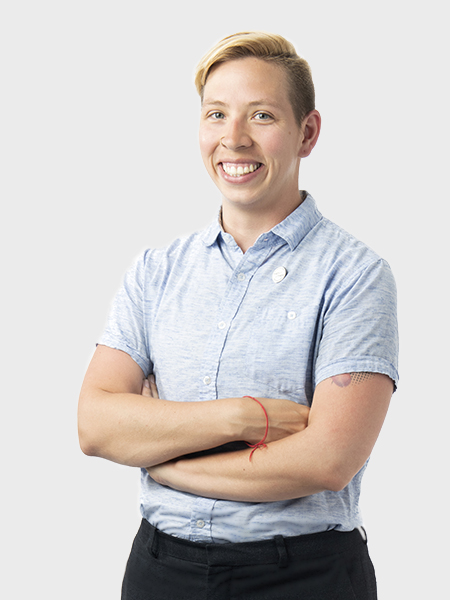In Defense of Immigrants

Photo by Edward Carreon for BU Photography
In Defense of Immigrants
As an immigration and criminal law attorney, V Starrett (’12) advocates for immigrants who come into contact with the criminal justice system.
In July, V Starrett (’12) was photographed with a client—a Belize-native and former US Marine—who had been turned away at the US-Mexico border after attempting to attend a citizenship interview in the United States.
The client, Roman Sabal, joined the US military using fraudulent identification. After he was honorably discharged, he was deported. Now, he can’t get back into the country to try to become a citizen.
That was one of Starrett’s least controversial cases. Starrett recently joined the Office of the Ventura County Public Defender in California where they serve as an immigration specialist trying to help mitigate potential immigration consequences for people who have been accused of crimes. Such guidance is required under Padilla v. Kentucky, a 2010 US Supreme Court decision holding that defense attorneys must inform noncitizens clients about how their criminal case might affect their immigration status. It’s a familiar role for Starrett, who started the immigration unit at the Legal Aid Society of Nassau County and also provided Padilla advice as a staff attorney at the Brooklyn Defender Services.
Sabal, whom Starrett represented as an attorney on Public Counsel’s Deported Veterans Legal Services Project, has no criminal convictions, previously served as a Marine and US Army Reservist for several years, and has two US citizen children with a US citizen partner he eventually plans to marry.
Starrett says they “have complicated feelings around” the publicity surrounding Sabal’s case (which was covered by several media outlets), adding that they try to avoid the dichotomy of the “bad immigrant” and the “good immigrant.”
“I don’t think that a criminal conviction should bar someone from being able to stay in this country, but I do think that Roman’s case is a good starting point because it brings in more people,” they say. “You get more people invested” in the cause.
Working with veterans—who generally, like Sabal, used fake identification to enlist or whose temporary immigration status expired while they served—was particularly “heartbreaking,” Starrett says.
“They took an oath to join the military about risking their lives, which is almost identical to the one you would take to naturalize,” they say. “Then, they’re ostracized.”
Immigration affects so much of people’s lives. If you can help someone fix that, you can set them on a trajectory to reach their full potential.
Starrett always knew they wanted to be an attorney; growing up in Las Vegas, they attended a magnet high school for law-related careers. At BU Law, Starrett participated in Professor Susan M. Akram’s International Human Rights Clinic and interned at the United Nations International Criminal Tribunal for Rwanda and the Office of the United Nations High Commissioner for Refugees in Geneva. But they ultimately felt they could make more of a difference representing individuals.
“The semester abroad really highlighted for me that there is a lot of work to be done in the United States,” they say. “In the immigration system, you can represent an individual person or family and actually make a significant impact.”
Starrett says they were drawn to criminal immigration work—also known as “crimmigration”—because traditional immigrants’ rights organizations often have to pick clients who won’t offend their funders in any way.
“We already know that brown and Black folks are criminalized at higher rates, that undocumented folks are criminalized at higher rates, that queer and trans folks are criminalized at higher rates,” they say. “So, to be excluded from traditional models of representation leaves this particular group the most marginalized.”
Working on immigration as a public defender means “those specific people who are not politically palatable are going to be my clients,” Starrett says. “And I love every single one of my clients.”
Starrett, who identifies as nonbinary trans, can relate to their LGBTQIA+ clients on a personal level.
“It’s really special to be able to connect with a client around our gender experiences,” they say. “At least they know I understand some small part of their life. It allows for a little more trust.”
Immigration has become a major flash point in the current political climate, but Starrett says there are always challenges representing immigrants.
“In some ways, [Trump] is highlighting the injustices that have always existed,” they say. “People didn’t realize because they didn’t have to. They think, ‘Obama is president; everything is fine.’ Under Trump, there are no illusions. Everything is in upheaval, which makes our jobs really difficult. We can give advice on what the law is today, and tomorrow the attorney general could rewrite it, which is what they’ve been doing.”
Starrett says they learned at BU Law that resolving people’s immigration issues can change their lives. They still keep in touch with their first asylum client—a “Lost Boy” from Sudan—whom Starrett helped obtain a green card. They recently heard the client was engaged and in touch with his family, whom he hadn’t seen in years.
“Immigration affects so much of people’s lives,” Starrett says. “If you can help someone fix that, you can set them on a trajectory to reach their full potential.”
